The lifespan of an RV battery varies by type. Traditional flooded lead-acid batteries typically last 2 to 3 years. AGM batteries usually last 2 to 4 years. Lithium batteries often last 5 to 10 years.
In this article, we’ll take a closer look at how long each type of RV battery lasts and what affects their longevity. You’ll also get tips on how to extend your camper battery’s life, recognize when it’s time to replace it, and discover the best RV batteries for your needs.
Table of Content
Types and Lifespans of RV House Batteries
Flooded Lead-Acid RV Batteries
Flooded lead-acid batteries are the most affordable and commonly used in RVs. They last 2 to 3 years and offer about 200-500 charge cycles. These camper batteries require regular maintenance, such as checking water levels and cleaning terminals. They are suitable for occasional RV use with basic power needs.
AGM RV Batteries
AGM (Absorbent Glass Mat) batteries are a type of sealed lead-acid battery. They can last 2 to 4 years and provide around 500-700 charge cycles. They are maintenance-free, more durable, and handle deeper discharges better than flooded lead-acid batteries.
Lithium RV Batteries
Lithium batteries, like LiFePO4 batteries, last 5 to 10 years and offer 3,000-15,000 charge cycles. They are lightweight, charge faster, and provide consistent power. Despite their higher upfront cost, lithium batteries offer superior performance and longevity, making them a strong choice for frequent or long-term use in RVs or motorhomes.
Redodo RV batteries offer 4,000+ cycles at 100%DOD and 15,000 cycles at 60%DOD. These batteries are equipped with Grade-A cells and ideal for RV or motorhome deep-cycle use, with the lifespan up to 10 years.
The Best Types of Batteries for Your RV
LiFePO4 batteries are the best for your RV. They provide consistent power with minimal maintenance, making them ideal for full-time RVers or those with high power needs. Although their upfront cost is higher than lead-acid batteries, they offer significant long-term value through durability and high efficiency.
|
Type of Battery |
Average Lifespan (Cycles) |
Average Lifespan (Years) |
|
Flooded Lead-Acid (FLA) |
200-500 |
2-3 years |
|
AGM Battery |
500-700 |
2-4 years |
|
Redodo LiFePO4 Battery |
4,000-15,000 |
Up to 10+ years |
Factors that Contributing to RV Battery Failure
The lifespan of RV batteries can be significantly impacted by several factors.
Temperature Extremes
Both high and low temperatures can drastically shorten battery life. For example, high temperatures (above 113℉ or 45℃) may cause internal damage and plate corrosion, in lead-acid RV batteries, potentially shortening their lifespan.
Freezing temperatures (below 32℉ or 0℃) can slow down the chemical reactions within RV lithium and lead-acid battery cells, reducing their ability to hold a charge. For RV owners who store lithium RV batteries in cold weather, this will cause the battery to temporarily not charge.
Overcharging
For lead-acid batteries, overcharging can easily cause excessive internal temperatures—known as "thermal runaway"—leading to plate damage and a shortened lifespan. In contrast, lithium RV batteries are safer, as their built-in BMS (Battery Management System) effectively prevents overcharging, over-discharging, overcurrent, overheating, and short circuits, ensuring safe battery operation.
Both incorrect settings in the RV battery’s charging system and the use of incompatible chargers can cause overcharging. It's important to know the ways to charge RV batteries to ensure optimal performance and longevity.
Frequent Deep Discharge
Lead-acid batteries are particularly vulnerable to deep discharges, which can reduce their capacity. Frequently discharging lead-acid RV batteries below 50% of their capacity can severely shorten their lifespan. In contrast, lithium batteries perform better in deep discharge.
Improper Storage
Storing a battery in a discharged state, especially during long periods of RV inactivity, can lead to a shorten lifespan. For lead-acid batteries, this causes sulfate buildup, which reduces their ability to hold a charge. Lithium batteries should be stored at around 50% charge and recharge them every three months. It's an important consideration for RV battery winter storage especially when not in use for extended periods.
Corrosion and Loose Connections
Corrosion on terminals and loose connections can increase resistance and prevent proper charging. Lead-acid batteries, commonly used in RVs, are vulnerable to corrosion on terminals, which can accelerate the life process. Lithium RV batteries are less susceptible but still require clean, secure terminal connections for efficient operation.
Overuse of High-Power Loads
Using power-hungry devices in your RV, such as air conditioners or microwave ovens, can quickly drain batteries with limited output power. This leads to shorter battery discharge times, thereby reducing the battery's lifespan.
If your RV is equipped with high-power appliances, consider upgrading your battery to a higher-capacity battery, like Redodo 200Ah Plus deep cycle battery. It offers a larger 2560W power output, which is equivalent to four 100Ah AGM batteries.
How to Extend RV Battery Life?
Proper care and maintenance help to extend the lifespan of your camper battery. Here are key practices for you:
Regular Charging
For lead-acid batteries, keep the charge above 50% to maintain battery life. Charge your RV deep cycle battery every 1-2 weeks, even when not in use.
Lithium RV batteries can discharge at 100%, but it's best not to go below 20%. For long-term storage, regularly check the SOC (State of Charge), and recharge every three months to maintain 50% SOC.
Monitor Voltage Levels
Both over-discharging and overcharging shorten battery life. For 12V lead-acid batteries, the voltage should not be lower than 13.8-14.4V when fully charged. A 12V lithium battery should maintain a resting voltage of at least 13.3V when fully charged.
Disconnect Timely
During extended storage, using a battery disconnect switch or disconnect the battery with the equipment timely prevents parasitic draws, such as alarms or interior lights, which can drain the battery. For lead-acid batteries, this step can significantly extend the life of the battery, especially when stored for weeks or months.
Maintain Clean and Secure Connections
Keeping battery terminals clean and secure is essential. For lead-acid batteries, clean connections every few months with a baking soda-water solution to prevent corrosion. Lithium batteries are less prone to corrosion, but regular checks for corrosion and connections is recommended.
Store in Moderate Temperatures
Although batteries have a wide operating temperature range—lithium batteries from -4°F to 140°F (-20°C to 60°C) and lead-acid batteries from -4°F to 122°F (-20°C to 50°C)—extreme temperatures can still reduce the capacity performance of RV batteries. Generally, lithium batteries perform best within a temperature range of 59°F to 95°F (15°C to 35°C), while lead-acid batteries are optimal between 50°F and 77°F (10°C to 25°C).
Optimizing Battery Setup for Your RV
When considering how many batteries are used in RV, in most cases, one or two 12V batteries (about 100-200 amp hours) should suffice for basic use. While larger RVs or those with heavy power consumption may need a higher-capacity camper battery like 300 amp hour lithium battery.
5 Signs It's Time to Replace Your RV Battery
Over time, RV batteries will naturally degrade, and it's important to recognize when it’s time for a replacement. Here are five key signs to watch for:
Decreased Run Time
If your RV battery no longer holds a charge as long as it used to, it’s a clear sign that its capacity is diminishing.
Frequent Charging
If you find yourself having to charge your RV battery more often than usual, especially when the power consumption hasn’t changed, it may be reaching the end of its lifespan.
Corrosion or Leakage
Corrosion around the battery terminals or noticeable leaks are signs of physical damage to the battery, which can impact performance and safety. If cleaning doesn’t resolve the issue, it’s time for a new battery.
Swollen or Bulging Battery Case
A swollen or bulging battery case often indicates internal damage due to overheating or deep discharges. It requires an immediate battery replacement.
Can I replace my RV house battery with a lithium battery?
Yes, you can replace your RV house battery with a lithium battery in most cases. Lithium batteries offer advantages like longer lifespan, lighter weight, and faster charging. Ensure your RV's battery charger is compatible with lithium batteries, as they typically have a higher nominal voltage (12.8V) than lead-acid batteries.
Best RV Battery for You
Redodo specializes in high-performance deep cycle batteries ideal for RV use. Here are some our RV batteries recommendations:
Redodo 12V 100Ah Lithium Battery for Camper
With a lifespan of up to 3,500 charge cycles, this 12V 100Ah lithium battery battery is ideal for RVers seeking long-term, cost-effective power. It provides 1280Wh of energy, enough to power essential appliances like lights, refrigerators, and small AC units for extended periods. At just 22.05 lbs, it’s lighter than traditional lead-acid batteries with the same capacity.
Redodo 12V 100Ah Small Lithium Motorhome Battery
Compact and powerful, this small 12V battery delivers 100Ah of energy while weighing only 19.13 lbs. Measuring 10.24 × 5.24 × 8.96 inches, its smaller size makes it ideal for tight spaces, without sacrificing performance. It’s an excellent choice for smaller RVs or campers where space is limited but reliable power is still required.
Redodo 12V 140Ah Lithium RV Battery with Bluetooth
With a larger capacity of 140Ah and a 150A BMS, this Group 31 lithium battery is perfect for RV owners who require more power for extended trips or larger camper setups. Bluetooth integration provides easy monitoring, including charge and discharge status, cycles, temperature, and overall battery health. It boasts a long lifespan of up to 10 years of service and over 3,000 cycles and is ideal for middle to large RVs use!
Redodo 12V 100Ah Smart Bluetooth Battery
With a compact Group 31 size, this smart lithium Bluetooth battery comes equipped with Bluetooth technology, allowing you to monitor battery status and performance through a mobile app and easily access to important data like voltage, temperature, and charge level. It's an excellent choice for tech-savvy RV owners who want reliable power and real-time insights.
Redodo 12V 100Ah Self-Heated Lithium Battery
This 12V self-heated lithium battery is ideal for RVs used in colder climates, ensuring your power remains consistent even in freezing temperatures. With a built-in heating system, it activates when temperatures drop below freezing, ensure the battery can be charged in cold environments and protect the battery’s performance. It offers 1280W of power and a long lifespan of up to 15,000 charge cycles (at 60% DOD), making it perfect for winter camping or RVers in cold regions.
Conclusion
Choose your ideal deep cycle RV batteries now catered to your expectancy, with flooled lead-acid batteries lasting 2-3 years, AGM batteries 3-5 years, and Redodo lithium batteries up to 10 years. Factors like temperature, charging habits, and storage conditions all impact battery longevity. Regular maintenance can help extend its life.
For reliable, long-lasting power, consider upgrading your lead-acid battery to Redodo’s high-quality RV and marine batteries, built for durability and performance. Find the perfect LiFePO4 battery for your needs today!
Read More:
How Long Will a 100Ah Lithium Battery Run a 12V Fridge?
What Size Battery Do I Need for My Camper? RV Battery Size Chart

Redodo

Redodo
Recent Post

How Long Does a Trolling Motor Battery Last?

Convert RV from Lead-Acid to Lithium Battery: A Complete Guide

How Long Will a 200Ah Battery Run an Air Conditioner?

A Full Review of Redodo 12V 140Ah Group 31 Deep Cycle Battery

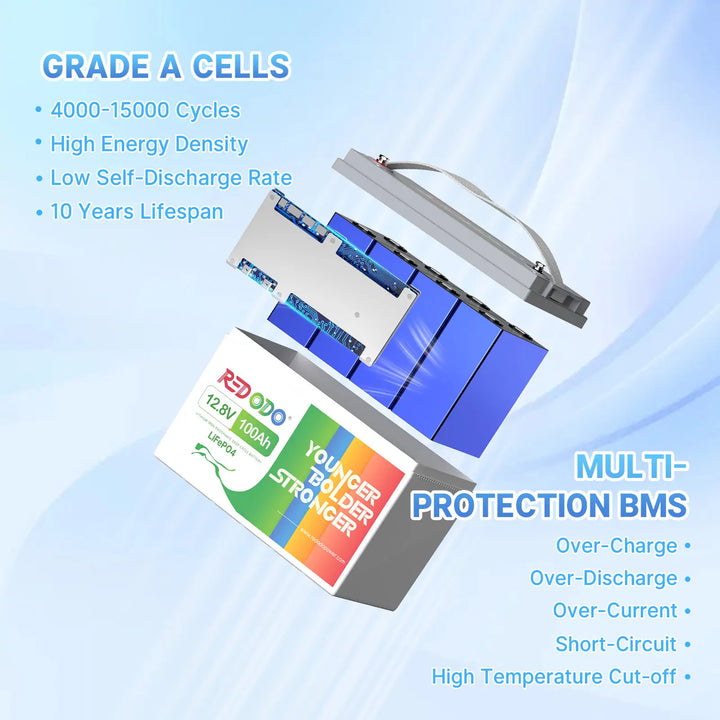
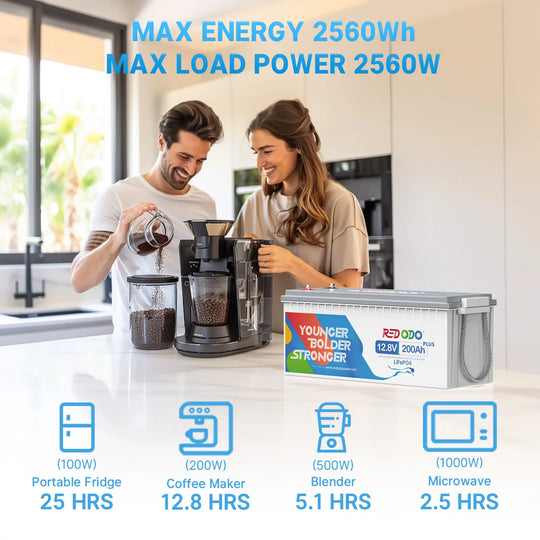
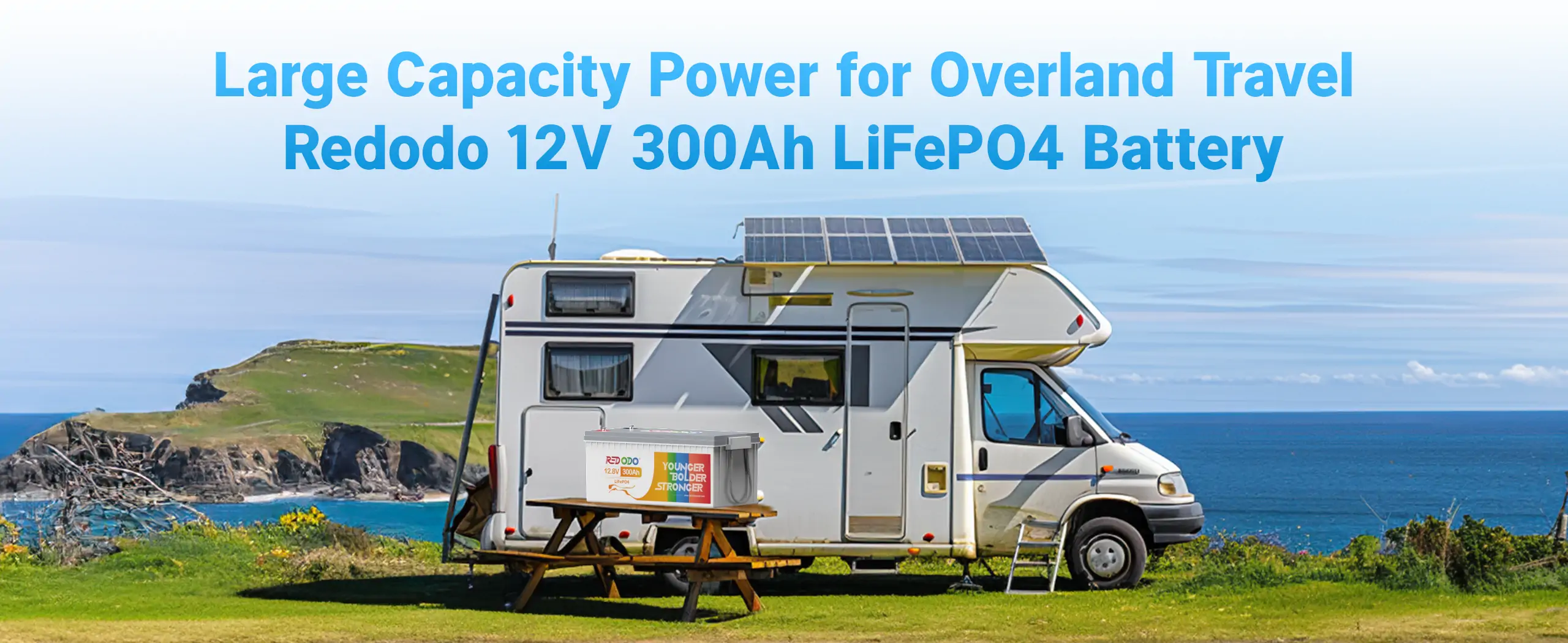
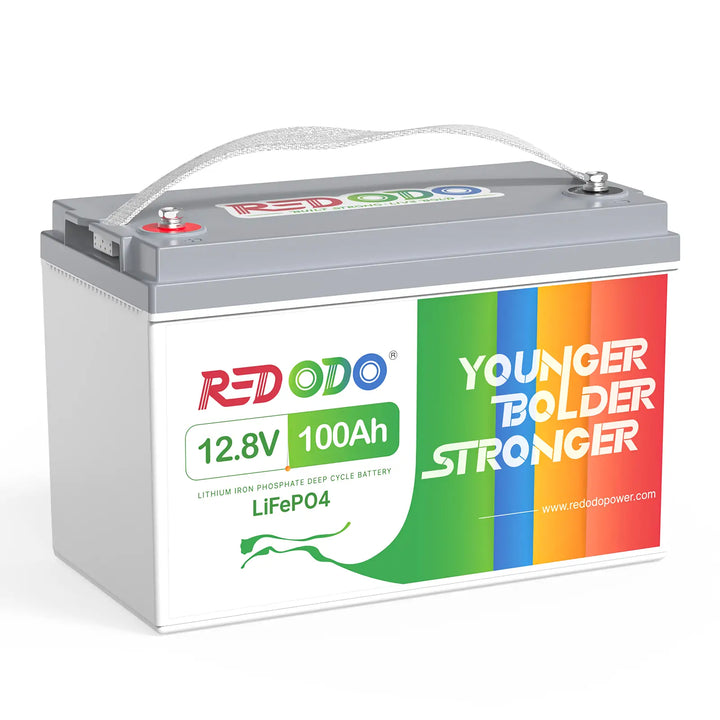
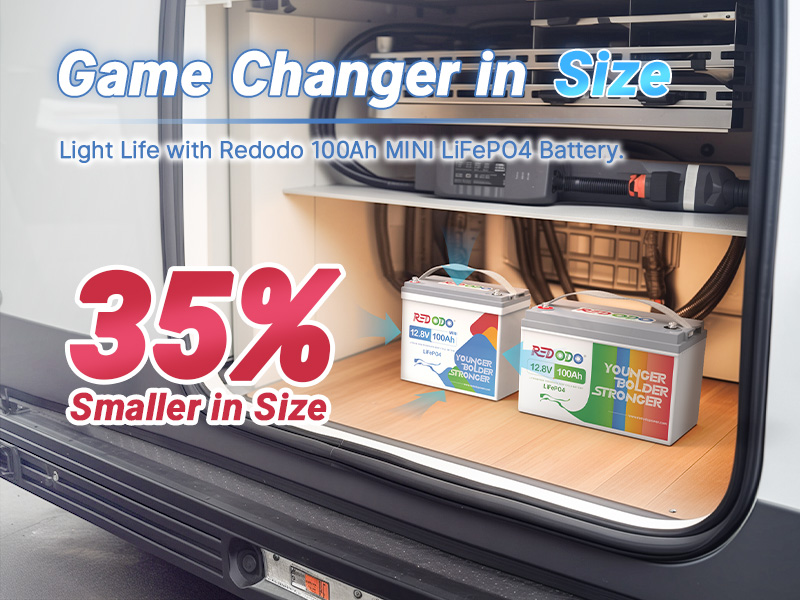
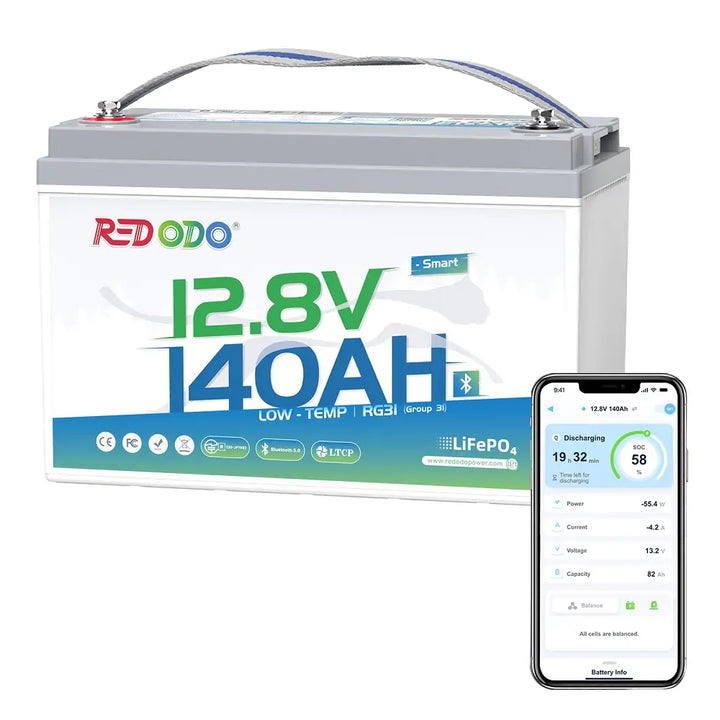
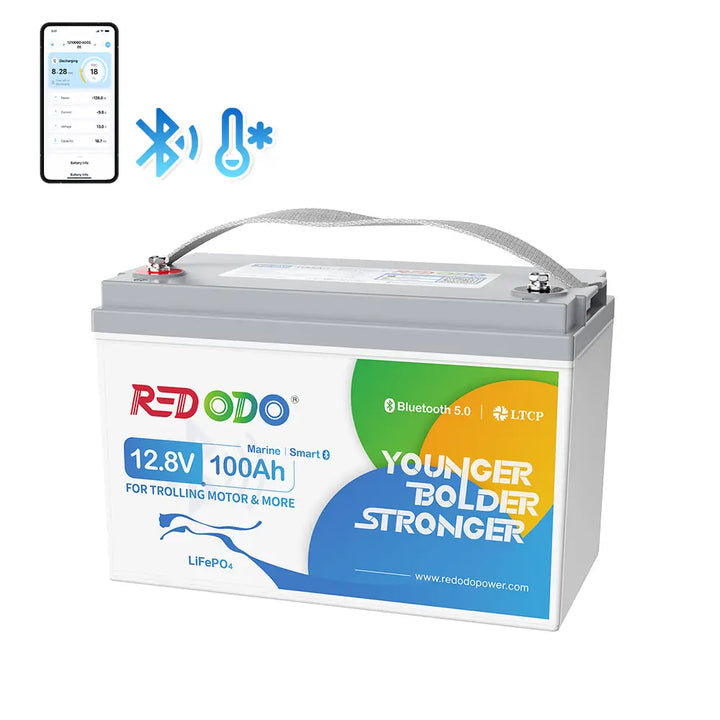
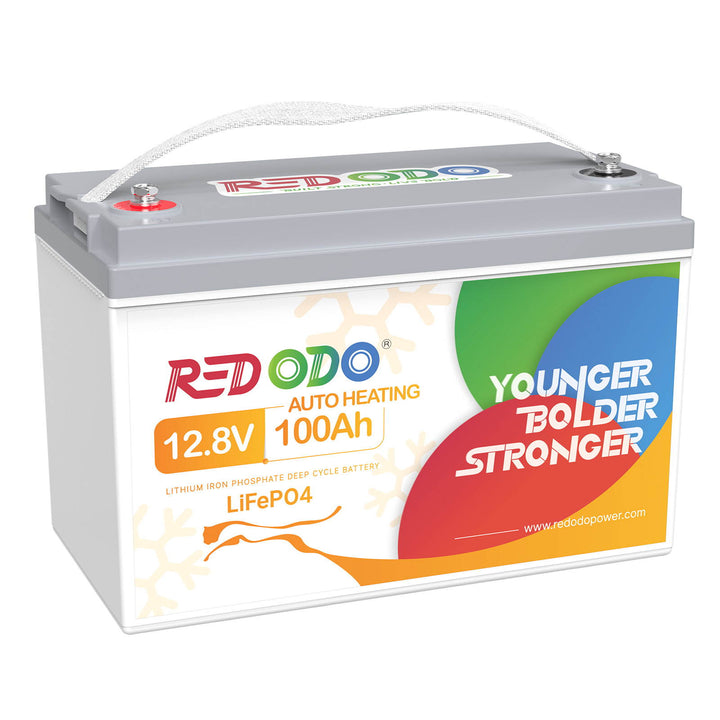
![⚡[$220 after Sign-Up] Redodo 12V 100Ah LiFePO4 Lithium Battery | Best Budget | For RV, Solar, Trolling Motor](http://www.redodopower.com/cdn/shop/files/Redodo_12v_100ah_lithium_battery_b9015ddd-64b5-4be2-8c88-392f0bb4ab30.jpg?v=1742973160)

![⚡[$239 after Sign-Up] Redodo 12V 100Ah Group 24 Bluetooth LiFePO4 Battery | Real-Time Battery Monitoring | For RV, Marine, Solar](http://www.redodopower.com/cdn/shop/files/Redodo_12V_100Ah_group_24_bluetooth_lithium_battery.jpg?v=1744253032)
![⚡[$220 after Sign-Up] Redodo 12V 100Ah Group 31 Bluetooth Lithium Battery | Real-Time Battery Monitoring | For RV, Marine, Solar](http://www.redodopower.com/cdn/shop/files/Redodo_12V_100ah_group31_bluetooth_lithium_battery.jpg?v=1745565708)
![⚡[$220 after Sign-Up] Redodo 12V 100Ah Mini Lithium LiFePO4 Battery | Smallest Battery | For RV, Trolling Motor, Solar](http://www.redodopower.com/cdn/shop/files/Redodo12V100AhMiniLiFePO4LithiumBattery.jpg?v=1739959054)
![⚡[$294 after Sign-Up] Redodo 12V 140Ah Group 31 Lithium Battery with Bluetooth | 40% More Capacity | For RV, Marine, Solar Home](http://www.redodopower.com/cdn/shop/files/Redodo_12V_140ah_bluetooth_battery_ee6d5fd1-5c7d-4b9a-90ab-d54d06b29a04.jpg?v=1742967763)
![⚡[$524 after Sign-Up] Redodo 12V 300Ah Lithium LiFePO4 Battery | Replaces 6*12V 100Ah AGM Batteries | RV, Marine, Solar](http://www.redodopower.com/cdn/shop/files/Redodo_12V_300ah_lithium_deep_cycle_battery.png?v=1744797523)
![⚡[$239 after Sign-Up] Redodo 12V 100Ah Mini Bluetooth LiFePO4 Battery | For RV, Marine, Solar](http://www.redodopower.com/cdn/shop/files/12V100AhMiniSmartLiFePO4LithiumBatterywithBluetooth1.webp?v=1741251007)

![⚡[$450 after Sign-Up] Redodo 12V 280Ah LiFePO4 Battery | Low Temp Protection | For RV, Marine, Solar](http://www.redodopower.com/cdn/shop/files/Redodo12V280AhLowTempCutoffLiFePO4Battery.jpg?v=1741251504)